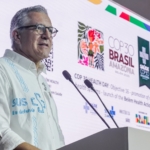
Brazil has launched the Belém Health Action Plan, the first international climate adaptation plan focused completely on health. The plan aims to help countries strengthen their health systems as the impacts of climate change become more serious and more visible.
According to the COP30 Presidency, the new plan places Brazil at the center of global discussions on climate and health. They say Brazil’s Unified Health System (SUS) shows why health must be a key part of climate action.
“We already have 80 countries and international partners engaged in this Action Plan, which is essential for advancing new steps,” said Ana Toni, CEO of COP30.
Brazil’s Minister of Health, Alexandre Padilha, said President Luiz Inácio Lula da Silva wants COP30 to be the conference of truth and real action.
“Brazil’s response is clear: it is time to move from reflection to joint action. Faced with an already altered climate, there is no alternative but for governments and public policies to adapt and confront climate change.”
The Belém Health Action Plan is built on three main pillars including surveillance and monitoring, evidence-based policies and stronger capacity, innovation, production, and digital health.
The plan follows key principles such as health equity, climate justice, and community participation. Its implementation will be supported by the World Health Organization (WHO) through the Alliance for Transformative Action on Climate and Health (ATACH).
Padilha stressed the urgent need for adaptation: “Adaptation must be treated with the same seriousness and political commitment as mitigation. For many countries, adaptation is a matter of immediate survival.”
WHO Director-General Tedros Adhanom said climate change is already harming national health systems. “The climate crisis is a health crisis,” he said, adding that climate adaptation in the health sector is already included in the Paris Agreement.
He praised the plan: “For decades, WHO has called for the adaptation of health systems and the strengthening of resilience to the climate crisis. The Brazilian government’s Action Plan is a way forward.”
Pan American Health Organization (PAHO) Director Jarbas Barbosa also warned that extreme heat and weather events are rising fast.
“We are no longer speaking of potential outcomes. Unfortunately, global warming is a reality and is accelerating. The most vulnerable communities undoubtedly bear the heaviest burdens,” he said.
He shared troubling numbers: heat has increased by 20% since the 1990s, and 550,000 people die every year from extreme heat.
“The Belém Action Plan is a major step forward…. We must also clarify and strengthen the training of health professionals.”
UNFCCC Executive Secretary Simon Stiell said the plan creates the structure needed for real results.
“The Belém Health Plan now provides us with a foundation. From here, we need coordinated, organized, and well-funded efforts to put these policies into practice.”
USD 300 million to support the plan
To help implement the plan, the Climate and Health Funders Coalition announced an initial investment of USD 300 million. The coalition includes more than 35 global philanthropic organizations, such as Bloomberg Philanthropies, Gates Foundation, IKEA Foundation, and The Rockefeller Foundation.
The funding will support solutions for extreme heat, air pollution, and climate-related diseases, and will help countries improve climate and health data for stronger health systems.
The plan is open for voluntary endorsement by countries, organizations, civil society, academia, the private sector, and philanthropies.
It forms part of the COP30 Action Agenda under Objective 16, which focuses on building strong and resilient health systems. It also supports Article 7 of the Paris Agreement, which sets the Global Goal on Adaptation, and aligns with major World Health Assembly resolutions.



